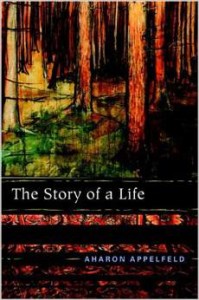Personal testimonies from the Holocaust are often too hard to bear. Physical and mental pain, depictions of incomprehensible cruelty, an almost tangible presence of death – they often come close to the edge of accepted artistic representation. But this tragic historical era, which affected the lives of millions, generated many different experiences. Not all Jews were transported to the death camps. Some wandered around Europe with a single aim: surviving one day after the other, with the hope that the end of the war was near.
Aharon Appelfeld (1932- ) is a perceptive and inspiring Israeli novelist, a Foreign Honorary Member of the American Academy of Arts and Sciences. His many books have been translated into various languages. He was born in Bukovina (then Romania, now Ukraine). His mother was murdered at the outbreak of WWII, and he and his father were deported from Czernowitz, their hometown, to Transnistria, a Nazi concentration camp run by Romanians. They had to walk all the way to the camp; Aharon’s father carried him, though he was already eight years old. When they got there, father and son were separated. Miraculously, Aharon managed to escape, and wandered alone in Europe for three years. After the war he joined other refugees in the Displaced Persons camps, from which he came to Palestine (soon to be Israel). He later served in the IDF, settled in Jerusalem, and began what would be a brilliant literary career.
Appelfeld’s novels are captivating, and go well beyond the historical circumstances they portray: Jewish life in Eastern Europe in the twentieth century, the Holocaust, and then life in Israel. In 1999 he published a short autobiography, titled A Story of a Life (2005 in English), portraying his early life in Czernowitz, his life during the war, and his first years in Israel.
The memoirs are fascinating. I find the depiction of the time he wandered alone in the Ukrainian forest almost mesmerizing; a child alone in the world, picking fruits, finding shelter to sleep, avoiding the Ukrainian peasants who likely would have delivered him to the Germans. His most constant experience was of fear; he distanced himself from anything strong, open, self-confident: “From the days of wandering in the fields and in the forests I learned to prefer the forest to the open field, stables to houses, the deformed to those who were healthy … objects and animals are true friends. I was sure they would do nothing to me. I became familiar with cows and horses, and they provide me with warmth that has remained with me to this very day.”
Wandering alone in the forest also provoked a religious sentiment. He came from a non-religious home, “I came from an assimilated home that had not a trace of religious belief. There was plenty of serenity and attentiveness, and we all treated one another with sensitivity—but it was all done on a rational basis. Formal religion was thought to lack real feeling; it was considered vulgar and ill conceived”. The affluent nature of his grandparents’ home in the countryside was the only source of a sense of mystery.
But walking by himself in the forest, God somehow turned into a tangible entity, as real to him as the memories of his father and mother. Scholars of comparative religion often point to an affinity between religious sentiments and a feeling towards a parent; Appelfeld’s words support this notion, “Later when I escaped from the camp and lived in the forest, this sense of mystery came back to me. I was certain God would save me and return me to my parents. If truth be told, throughout the war my parents were mixed up in my mind with God, as a kind of heavenly choir, accompanied by angels, that was supposed to come and save me from my wretched existence”.
His living alone in nature had another effect: he got used to being mute, to not speaking. A hostile environment and the lack of any friends or family made him exist in silence. All he could hear was an inner voice, perhaps a conversation between his mother, his father, and God. When he later came to Israel and joined a youth movement, as many young Israelis did at the time, “My days in the youth movement were hard for me because, among other things, I was suddenly surrounded by children of my own age and I was forced to speak. Both the presence of these children and the need to speak were in fact so hard for me on more than one occasion, I was ready to run away”.
Appelfeld later adjusted to life in Israel, and had a very productive literary career. But the traces of these early observations are easily discerned in his works. His protagonists are often introverted characters, sometime physically disabled, immersed in an inner world that they find hard to express. And they are – repeatedly – displaced from their homes.

Very moving life story- Thanks for sharing.
Very moving life story- Thanks for sharing it.